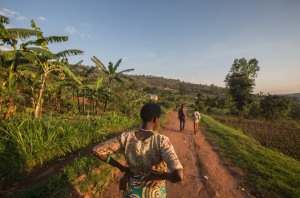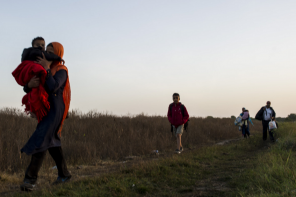We’re all watching the DR Congo with baited breath. The recent presidential election, or process that has borne the name, has sparked unrest and violence, inside the country and in the diaspora. It’s a grave situation, certainly, and a gloomy one.
But I’m having total post-electoral depression, especially when I read this piece in Foreign Policy. Take out the context — I can’t believe I’m saying that, but try it — and you have the same story of so many other sub-Saharan elections. I’ve watched four of them in the last year, and read about others.
The whole thing is so damn obviously predictable that I can’t bear to point it all out. So instead, I’ve made this handy crib sheet, Mad Libs style, for journalists and other observers who may need to cover another election that looks exactly like the last election we covered, borrowing from (without blaming) the FP piece above. Just fill in the blanks with the relevant details. Whatever you do, don’t get distracted by actually talking to citizens of the country you’re covering. Especially intellectuals.
(Note to freelancers: Just because an election seems to fit the bill doesn’t mean you can sell the story. Think twice before you hitch your rent payment to covering the vote in, oh, Burundi.)
It’s not the media’s fault, of course. There’s books to be written on this whole thing… oh. wait. Wars, Guns & Votes was a bestseller? Well, surely there’s another book to be written.
And if you don’t believe that the media only covers elections with this formula, ask yourself if you remember reading any good analytical coverage of the recent presidential vote in Zambia. It’s a huge copper producer, so “financial interest” doesn’t answer the question. Peaceful country with a peaceful vote, free and fair, and then a peaceful transition of power? Who wants to read that? Especially when there are other Africans we just totally know ready to kill each other.
Covering African Elections: A Crib Sheet
These days, nowhere are crises more predictable than in __________ (poor/recently violent country). And yet, when they unfold as anticipated, Western policymakers and diplomats always seem caught off guard — raising questions about the competence, willingness, and commitment of the ________(captial city)-based diplomatic corps and the United Nations mission to discharge their responsibilities.”
“….Nothing underscores the apathy and inconsistency that characterize Western diplomacy in _____ more than the current impasse…The legitimacy crisis threatens to trigger another round of civil war in a country that has already __________ (short-phrase recap of how many people died there in recent memory, thereby justifying interest).”
“The ____________[major INGO] cited serious irregularities, including the loss of _____ (electoral documents) in _______ (city/town/village), a _____ stronghold….. Meanwhile, according to ________ (INGO) multiple locations in _______ (another city/town/village), a bastion of __________ (current ruler) supporters, reported impossibly high rates of 99 to [over] 100 percent voter turnout, with all or nearly all votes going to the incumbent.” (Note: Some wisely fix this slightly lower than 99 percent; adjust as needed.)
“….As grievances and disputes over electoral law arose, the CENI [independent electoral commission] failed to provide an adequate forum for dialogue with the opposition.” (Sorry, players, that one goes verbatim in every election post-game.)
“…..The independence of these commissioners has been called into question as _____ has regularly shown bias against ______”
“…..These same international actors remained silent about the allegations of fraud and irregularities, even as _________ (local/national orgs) denounced violence and abuses. Their silence has helped spawned (sic) a crisis that could have easily been averted.”
“…. ________ (incumbent) waited nearly ___________ days(/hours) to hold a news conference and react to… _____________ (oppostion’s) rejection of the results.
Oh who are we kidding? This could go on forever….




Jina,
But wait . . . this time the U.S. government has today offered POST-ELECTION technical support to address voting irregularities according story on BBC. You can’t fix an election after the fact except by replacing it with a new one, but at least this time there appears to be some will not to try to pretend the election was something it wasn’t.
What do you think?
I’m more persuaded on the “not trying to pretend” front by the Carter Center’s strong statement. If the observer missions hadn’t said anything, the USG and others would have no tension to resolve/nothing to react to. If Kabila stays, these will remain “irregularities.” If Kabila goes, the irregularities will suddenly be called “fraud.”
I’d like to think that if the “irregularities” upon proper review merited an upgrade, so to speak, they’d be called “fraud” regardless of political calculations, but after covering Burundi, and watching Cote d’Ivoire, I just don’t think that’s true. The chief of the EU Mission in Burundi seemed to think it was all about intention — “Yes there wre of coure errors, irregularities, but it was not to affet the result, this is difficult to say, certainly it was not an intention of fraud,” she told me — and what ruling party leaves a good track record of their intent to perpetrate fraud?
Jina,
You understand too well! At the same time, it is as it should be that the Carter Center was in the lead in making an independent determination–that is what they are there for. At least in terms of the “public diplomacy” regardless of what was going on out of the eye of the media, the State Department and other diplomatic missions stayed fairly quiet until the observers had the opportunity to come to a clear position.
Since I have been critical of the breakdown of the process when I was involved in it in Kenya in 2007-08, I want to make sure to recognize a case where things appear to have been handled better so far.
I defer to your expertise and proximity as far as what prospects are going forward–you have seen more of these up close than I have, but I do think that the Carter Center statement makes it hard to brush aside the problems with the conclusory cannards about “the will of the people”.
Happy Holidays and thanks for a great post, as always!
Ken
Ken, I think you’re right to give credit to the independence of the Carter Center, and the role an independent org can play in the process, if they’ve got the balls to do so. I also wonder how much the international reaction has figured into this; the Congolese diaspora and its friends have done an impressive job of making this a situation that others must also answer for (some unfortunate getting-out-of-hand, which hasn’t become the norm, aside). That wasn’t the case in Burundi, or even it seemed to me from afar with CdI. Politics still carries the day, I would imagine, but Carter and others have succeeded in making the “questionable election” narrative a political variable (even if that wasn’t their intention). We’ll have to wait until someone FOIAs the cables to really know, I guess.
I’m really glad, thought, that you’re looking for things that, if they’re not working, are at least better moves than you saw in Kenya in ’07-’08, and I’ve seen and recounted elsewhere. It’s the more useful response, certainly, and probably also more revealing. After all, embedded in my cheeky post is also a critique that we look the same way at these things, and I’m glad you’re challenging me to look differently.
One caution — I’m not in Congo (I’m in Zambia at the moment), and I’m not plugged in to anything special there. I’m just reading the news as you are, though clearly with a bitter taste from Bujumbura still lodged somewhere in my throat…
Happy holidays to you, too, Ken. Thanks for reading and engaging.
Re: 1st sentence. It’s *bated* breath, not baited breath. Otherwise great post.
I laughed at this post to avoid crying. *sigh!* LOVE this line especially: “Whatever you do, don’t get distracted by actually talking to citizens of the country you’re covering. Especially intellectuals.” How different and varied the news would be otherwise!
Jina, you provided great inspiration for me in my coverage of another rigged election – that for the head of the World bank. Have a look at how well your crib sheet can be adapted:
http://www.worldbankpresident.org/peter-chowla/media/journalists-crib-sheet-how-to-cover-world-bank-elections